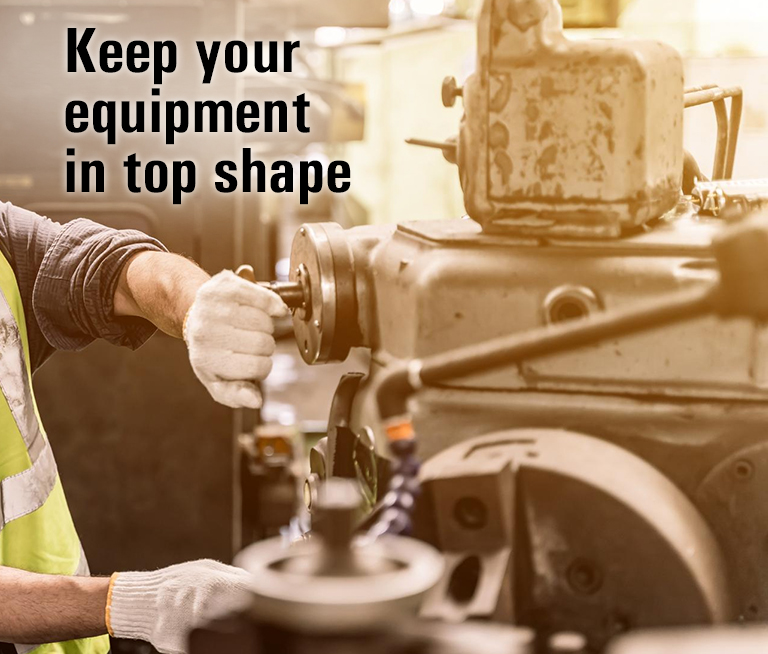Essential Maintenance Tips for Your Heavy Equipment
Posted on: July 27, 2023
By : PRODUCTS & BRANDS

Heavy equipment is the backbone of many industries, from construction and mining to agriculture and transportation. These powerful machines are instrumental in completing various tasks efficiently and effectively. However, to ensure their longevity and optimal performance, proper maintenance is crucial. Neglecting maintenance can lead to costly breakdowns, reduced productivity, and safety hazards. In this blog, we will discuss five essential maintenance tips to keep your heavy equipment running smoothly and maximize its lifespan.
Regular Inspections and Cleaning
Regular inspections are the first line of defense in preventive maintenance. Conduct daily or pre-shift inspections to identify any potential issues before they escalate into major problems. Inspect crucial components such as tires, belts, hoses, and hydraulic systems for signs of wear, leaks, or damage. Pay attention to unusual noises or vibrations during operation, as these can indicate underlying issues.
Furthermore, keeping your heavy equipment clean is an often-overlooked maintenance practice. Dust, dirt, and debris can accumulate on the equipment, leading to clogged air filters, overheating, and premature wear. Regularly clean the exterior and interior components and use compressed air or water to clean hard-to-reach areas. Maintaining a clean machine not only extends its lifespan but also enhances safety and operational efficiency.
Follow Manufacturer's Maintenance Schedule
Each heavy equipment model comes with a manufacturer's maintenance schedule outlining recommended service intervals and procedures. Adhering to this schedule is vital to keep your equipment in peak condition. The maintenance schedule typically includes tasks such as oil and filter changes, lubrication, belt replacements, hydraulic system checks, and more.
Keep a detailed record of all maintenance activities, including dates and tasks performed. This maintenance log serves as a valuable reference for tracking service history and identifying patterns of recurring issues.
Proper Lubrication
Adequate lubrication is essential to reduce friction, wear, and tear on moving parts in heavy equipment. Greasing pivot points, bearings, and other components according to the manufacturer's recommendations ensures smooth operation and minimizes the risk of costly breakdowns.
Follow the right lubrication procedures, including cleaning grease fittings before greasing and using the correct type and grade of grease for each application. Over-greasing can be as damaging as under-greasing, so it is essential to strike the right balance.
Train and Empower Operators
Proper operation of heavy equipment is crucial for its longevity and performance. Providing comprehensive training to equipment operators ensures they understand the machine's capabilities, limitations, and safe operating practices. A well-trained operator can detect early signs of issues and respond appropriately to prevent further damage.
Encourage operators to report any unusual sounds, vibrations, or performance changes during equipment operation. Creating an open communication channel between operators and maintenance staff allows for timely troubleshooting and maintenance.
Additionally, empower operators to perform daily inspections and basic maintenance tasks, such as checking fluid levels, ensuring proper tire pressure, and cleaning the equipment. These small efforts can go a long way in preventing potential problems and promoting a culture of proactive maintenance.
Address Repairs Promptly
Ignoring or delaying necessary repairs can lead to more extensive and costly damage to your heavy equipment. Promptly address any identified issues during inspections or reported by operators. Early intervention can save you from expensive repairs and downtime.
Engage the services of qualified technicians or mechanics who have expertise in heavy equipment maintenance. Invest in high-quality replacement parts that meet or exceed the manufacturer's specifications. While it may be tempting to opt for cheaper aftermarket parts, they may not provide the same level of reliability and performance.
Conclusion
Maintaining heavy equipment is not just a matter of extending its lifespan; it is essential for the safety of operators and the overall efficiency of your operations. Regular inspections, proper lubrication, cleanliness, fluid and fuel management, tire and track maintenance, and operator training are five essential maintenance tips that will help you keep your heavy equipment in top-notch condition.
By incorporating these practices into your maintenance routine, you can minimize downtime, reduce repair costs, and ensure that your heavy equipment consistently performs at its best, contributing to the success and profitability of your construction, mining, or transportation projects. Remember, prevention is always better than cure, and investing in maintenance today can save you from costly repairs and project delays tomorrow.